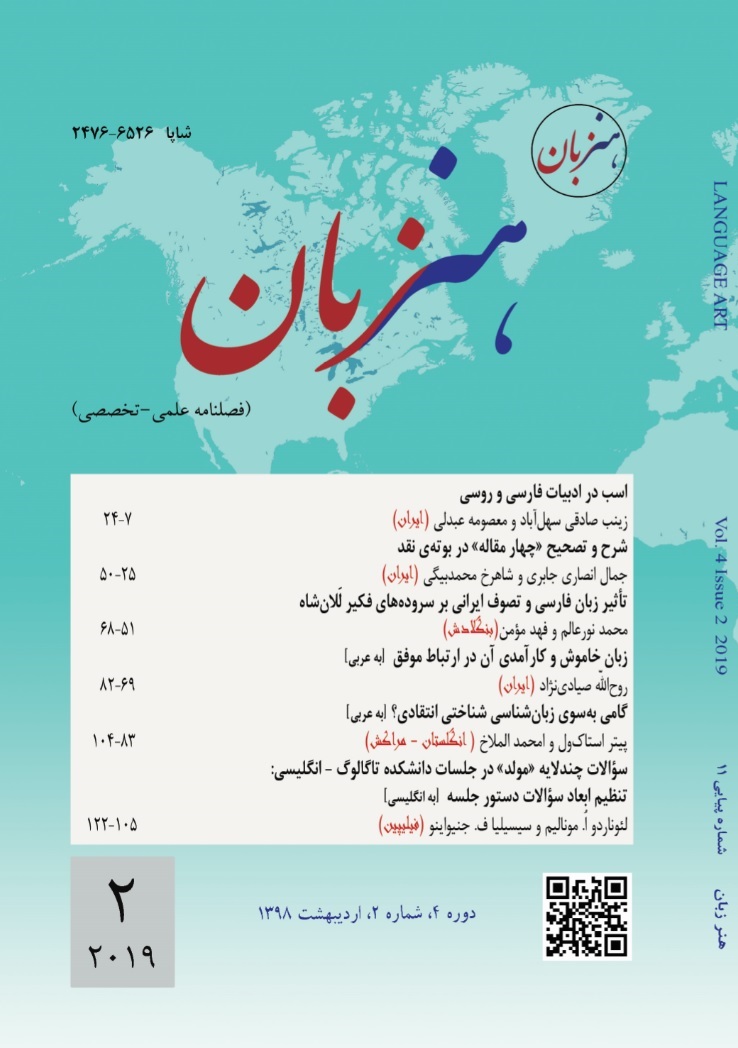تأثير زبان فارسی و تصوف ايرانی بر سرودههای فکير لَلانشاه
DOI:
https://doi.org/10.22046/LA.2019.09الكلمات المفتاحية:
فکير لَلانشاه ، ادبیات، سرودهها، ادبيات بنگالی، معنویت و تصوف، زبان فارسی.الملخص
فکير لَلانشاه غزلسرایی نامدار و مشهور در زمينهی موسیقی بنگلادشی است. درحدود دههزار غزل از ترانههای عامیانهی وی بهطور شفاهی گردآوری شدهاند که فقط هزاروصد ترانه تاکنون بهدست ما رسیده است. استنباطهای متفاوتی از دیدگاههای مذهبی لَلانشاه وجود دارد؛ وی اشعاری دربارهی عشق، برابری و تصوف سروده است. زمانیکه او در سرزمين بنگال چشم به جهان گشود، سراسر منطقهی شبهقاره مستعمرهی امپرياليسم دولت انگليس بود. زبان فارسی در شبهقارهی هند بيشاز ششصد سال رواج داشت و بهويژه در دورهی مغول بهعنوان زبان رسمی استفاده میشد. از آن زمان، زبانوادبيات فارسی، فرهنگورسوم ايرانی با زبانوادبيات و فرهنگورسوم بنگالی مخلوط شد که تأثير شگرفی بر ادبيات بنگالی گذاشت. بسیاری از شاعران بنگلادشی از عناصر و واژههای فارسی در ادبیات خود بهره جستند. آنها همچنین کتابهایی به زبان فارسی چاپ کردند که نسخههای خطی آنها را میتوان امروزه در این منطقه پیدا کرد. بههمینترتیب، سرودههای صوفیانه و ترانههای عامیانهی لَلانشاه در ایران نیز یافت میشوند و ایرانیان نیز از عناصر و واژههای فارسی اشعار او بهرهمند شدهاند. در این جستار، دربارهی تأثير زبان فارسی و تصوف ايرانی بر سرودههای این شاعر بحث خواهیم کرد.المراجع
Abd Al-mannan. (2009). Lalon dârʃon (Lalon's Philosophy), Dhaka: Rudila.
Abd Al-mannan. (2010). Lalon samâqru (koliyâte lalon), 2nd Ed., Dhaka: Nalenda.
Ahmad, S. (2009), qurân dârʃon (The Philosophy of Quran), Dhaka: Sadr.
Anvar Al-karim. (2005). taʔsire tasavof bar sorudhâye lalon, Journal of Bengla Academy, Nos. 3 & 4, Dhaka.
Attar, F. (1990). The Conference of the Birds (Mantiq ut Tayr), Compiled & Emended by: Ahmad Ranjbar, 2nd Ed., Tehran: Asatir.
Chishti, M. (2003). Divâne moʔineddine čeʃti, Compiled, Emended, and Translated by: Jihad Al-eslam & Seif Al-eslam Khan, Dhaka: Khaje Manzel Pubs.
Ganjoor (ʔâsâre soxanguyâne pârsigu): http://ganjoor.net/.
Ghanbari, B. (2016). Darke hozur: namâz dar negâhe molavi, Journal of Islamic Research, Dec 11th, 2016: http://qunoot.net/App/reads.item.php?showid=1855.
Haeri, M. (2003). ʔerfân va tasavof (Textbook), Tehran: International Al-Hadi Publications.
Haeri, M. (2007). Mabâniye ʔerfân va tasavof va ʔadabe pârsi, 1st Ed., Tehran: Nashre Elm.
Hafez. (1997). Divâne hâfez, Compiled & Emended by: Rashid Eyvazi, 1st Vol, Tehran: Iran Mehr.
Hasan, A. (2016). Falsafe va ǰâmeʔeʃenâsiye fakir lalon ʃâh, Dhaka: Universal Academy Pubs.
Kamol, E. (2008). Controversies Shroud Lalon and His Songs, Oct 16th, 2008: https://www.thedailystar.net/news-detail-58830.
Mezhar, F. (2010). Sorudhâye lalon ʃâh, Dhaka: Muli Bradars Pubs.
Mia, A. (2014). Lalon dârʃonir bumikâ (The Role of Lalon's Philosophy), Dhaka: Nabojuq.
Minaei, M. (1950). manʃaʔe tasavof ʔaz koǰâst? Journal of Persian Literature, Tabriz University.
Moin, M. (1996). Farhange fârsi, Tehran: Amir Kabir.
Moshiri, M. (1995). Farhange zabâne fârsi: alefbâyi-qiyâsi, 3rd Ed., Tehran: Soroush.
Nizami Ganjavi, J. (1997). Khosrow & Shirin, Emended by: Barat Zanjani, Tehran: Tehran University Publications.
Noor Al-Hoda, M. (2019). Bangladesh & Persian Literature, Vista Magazine, July 1st, 2019: https://vista.ir/article/206722.
Rezazadeh, Sh. (1936). ʔasrâr al-tohid, Mehr Magazine, Vol. 4, No. 4, Tehran.
Sajjadi, J. (2004). Farhange ʔestelâhât va taʔbirâte ʔerfâni, 7th Ed., Tehran: Tahouri.
Sarkar, K. (2015). banglâdeʃe fârsi onobed sâhito 1971-2005, (Persian Translation of Literature in Bangladesh 1971-2005), Dhaka: Bangladesh Asia Society.
Siraj Al-eslam. (2011). Banglapedia (in Bengal), Vols. 8 & 12, Dhaka: Bangladesh Asia Society.
https://www.kalerkantho.com/print-edition/islamic-life/2016/02/26/329231/

